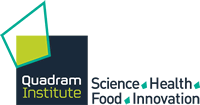Dr F Warren
No more applications being accepted
Competition Funded PhD Project (European/UK Students Only)
About the Project
We are looking for a creative and motivated PhD candidate with a background in microbiology or biochemistry to join a dynamic and multi-disciplinary group investigating interactions between carbohydrates in foods and gut microbiota. This position is jointly hosted by the Warren and Hall labs at the Quadram Institute.
Within our gut we host a wide range of microbes (termed microbiota) which are essential for our health and wellbeing. One of the dominant microbial genera which have been identified as central to maintaining good health is Bifidobacterium, a key carbohydrate degrader. However, efforts to use Bifidobacterium to improve health have achieved limited success, with a stumbling blocks being our limited understanding of the mechanism by which different species of Bifidobacterium utilise carbohydrates.
Focussing on starch, the goal of this project is to elucidate the mechanism by which different Bifidobacterium species degrade carbohydrate, and the role of the physical structure of starch in influencing interactions with different Bifidobacterium species. This will be assessed using microbial growth assays and K.O. analysis, alongside bioinformatics analysis of transcriptional data. This knowledge will then be taken forward to assess the effectiveness of Bifidobacterium strains at remodelling the microbiota in models of the lean and obese gut microbiota.
This PhD studentship represents an excellent training module for a wide range of bioinformatic techniques in tandem with microbiology methodologies including: next generation DNA sequencing, bacterial culturing, model colon systems and molecular mutagenesis techniques.
Norwich is a leading microbiology and microbiota research centre and represents an excellent platform for a starting scientific career.
This project has been shortlisted for funding by the Norwich Biosciences Doctoral Training Partnership (NRPDTP). Shortlisted applicants will be interviewed as part of the studentship competition. Candidates will be interviewed on either the 9th, 10th or 11th January 2018.
The Norwich Biosciences Doctoral Training Partnership (NRPDTP) offers postgraduates the opportunity to undertake a 4 year research project whilst enhancing professional development and research skills through a comprehensive training programme. You will join a vibrant community of world-leading researchers. All NRPDTP students undertake a three month professional internship (PIPS) during their study. The internship offers exciting and invaluable work experience designed to enhance professional development. Full support and advice will be provided by our Professional Internship team. Students with, or expecting to attain, at least an upper second class honours degree, or equivalent, are invited to apply.
For further information and to apply, please visit our website: www.biodtp.norwichresearchpark.ac.uk
Funding Notes
Full Studentships cover a stipend (RCUK rate: £14,553pa – 2017/8), research costs and tuition fees at UK/EU rate, and are available to UK and EU students who meet the UK residency requirements.
Students from EU countries who do not meet the UK residency requirements may be eligible for a fees-only award. Students in receipt of a fees-only award will be eligible for a maintenance stipend awarded by the NRPDTP Bioscience Doctoral Scholarships, which when combined will equal a full studentship. To be eligible students must meet the EU residency requirements. For funding eligibility guidance, please visit our website: http://biodtp.norwichresearchpark.ac.uk/how-to-apply/funding-and-eligibility

 Continue with Facebook
Continue with Facebook

